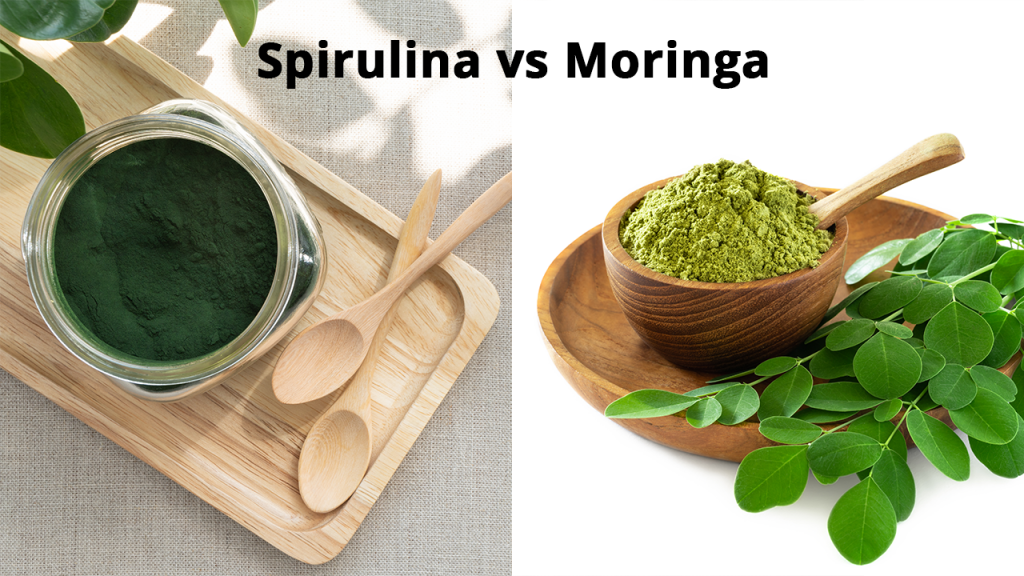
Though moringa and spirulina are complete plant proteins as they contain all nine essential amino acids. Moringa has been showing up strong with other Super greens, like matcha, spinach, and kale. This time I would like to compare it with everyone’s favorite blue-green algae, spirulina. But before we get into the Spirulina vs Moringa debate, let’s understand what these two are.
Spirulina is blue-green algae that grows on both fresh and saltwater. These tiny algae are packed with nutrients. In modern times, spirulina can provide many benefits. It is a rich source of protein and also a good source of beta-carotene, various minerals, and gamma-linolenic acid, an essential fatty acid. Spirulina is available in the form of capsules, tablets, and powder and can be incorporated in certain foods and beverages such as energy bars, popcorn, and smoothies.
Moringa Oleifera (drumstick tree) has been praised for its many health benefits for thousands of years. It is very rich in antioxidants and bioactive plant compounds which are good for health. So far, scientists have only investigated a few of the many reputed health benefits. It is known by many different names, such as drumstick tree, horseradish tree or ben oil tree.
Spirulina is a mighty protein beast, as it is high in protein as it actually holds the number one position on two points: highest protein content per calorie, and highest protein content per ounce. As 100 g of spirulina contains 58 g of protein. But you know we are not here just tell you how great spirulina is. For this battle, moringa will be depending on a few standbys: its high iron content, as well as its respectable amounts of vitamin A, calcium, and fiber.
So, without wasting time let the Battle of the Greens begin!
Spirulina Vs Moringa
For this Spirulina vs Moringa debate, we will be comparing 10g (about 1 tablespoon) powder of each.
| Spirulina | Moringa | |
| Protein | 5.75g | 2.7g |
| Calcium | 174mg | 12mg |
| Iron | 15.8mg | 2.85mg |
| Fiber | 3.3g | 0.36g |
| Vitamin A | 910iu | 57iu |
| Potassium | 140mg | 136.3mg |
| Carbohydrate | 5.1g | 2.39g |
| Sodium | 2mg | 105mg |
| Calories | 35 | 29 |
| Vitamin C | 0.99mg | 1.01mg |
Antioxidants Properties
Both Spirulina and Moringa are excellent sources of antioxidants. Each of them contains several different antioxidants, but spirulina falls just a little short when compared to moringa.
Moringa contains almost 40 known antioxidant compounds, whereas spirulina contains almost half of that. As moringa contains a great number of antioxidants in terms of the overall content, this round also goes to moringa.
Side-Effects
Moringa is considered to have no side effect, but the roots can be very poisonous. This is why one must keep in mind that only moringa fruit, leaves or seeds are meant for human consumption. Spirulina on the other hand has some potential side effects, although they are seemingly rare. The various side effects include stomach ache, constipation, dizziness – pretty much the usual suspects. According to the National Institute of Health, “People with autoimmune diseases – such as lupus, rheumatoid arthritis (RA), multiple sclerosis (MS), and pemphigus vulgaris – might have to avoid spirulina because these blue-green algae may have immune-boosting properties, which in turn might worsen the symptoms of auto-immune diseases”. The NIH also points out that spirulina contains amino acid phenylalanine, which may worsen phenylketonuria, so people with this metabolic disorder should also avoid spirulina.
We’ll call this round a wash given both super greens carry some risks, however minimal they may actually be.
Final Verdict: Who Wins?
Moringa knocks out spirulina 7-3 with several definitive points and wins. As it turns out, spirulina is kind of a one-trick pony as it just has high protein content, it really wasn’t very competitive in any of the other categories. Both moringa oleifera & spirulina, in the case of antioxidants, each contain several different antioxidants, but spirulina falls just a little short when compared to moringa. In case of side effects, both super greens carry some risks, but here as well, moringa hits the goal in case of autoimmune diseases. So if we take an overall review, I feel moringa wins!
We hope this article on Spirulina vs Moringa helps you make healthier choices! Do let us know your thoughts in the comments below! For more on nutrition, check out Healthy Reads or tune in to LIVE sessions by experts on GOQii Play.
#BeTheForce




Why didn’t you mention the vitamin B?